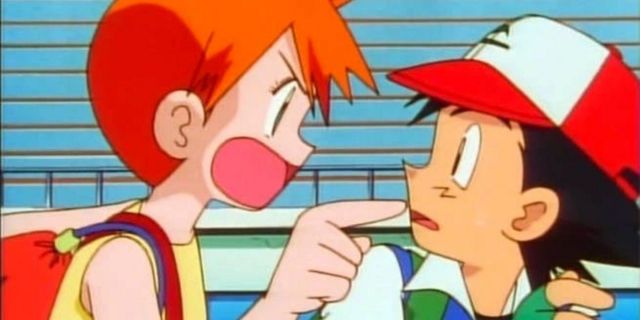Every Pokémon fan has their favorite characters from the hit anime. Although Ash Ketchum’s fantastical adventures in the series recently came to an end after 25 years of success, there’s still plenty to talk about when it comes to the show’s enormous cast of characters.
Since making her memorable debut early in Season 1 of Pokémon, Misty remains a hugely popular character to this day. Despite Ash’s myriad of great travel companions over the years, plenty of Pokémon fans out there are proud to claim the fiery redhead as the series’ singular “Best Girl”. However, there are others who disagree and believe Misty’s popularity is more driven by nostalgia.
Misty’s Abusive Tendencies Don’t Appeal to All Modern-Day Pokémon Fans
Many trainers within the Pokémon anime sadly mistreat their Pokémon, even giving them away to other trainers or abandoning the poor creatures entirely. Although Misty doesn’t abandon her Psyduck, she doesn’t treat it with much care or respect either. Seeing the abuse of one’s Pokémon — including by a character established as one of the heroes — is enough to give any viewer pause. It also doesn’t make much sense, even as a narrative choice. Misty yelled at her Psyduck and generally berated it on a regular basis, often calling the poor Pokémon “useless.”
Misty fans often defend this behavior on the basis that Pokémon’s early seasons aired at a time when the TV viewing experience was quite different from today. Older series, including anime, often had controversial humor that many modern-day fans wouldn’t approve of. It’s important to remember that Pokémon is clearly a product of the time it was created, and comedy within the anime industry changes and evolves as writers learn what viewers are enjoying most.
Many older fans who have watched anime for decades understand that slapstick humor is a niche, and arguably overdone, form of comedy. This type of humor has aged badly in some instances, bordering on abusive behavior that truly isn’t funny to a wide variety of viewers. However, some Pokémon fans can agree to disagree when it comes to liking Misty.
It’s also possible to argue that Misty was meant to fall into the tsundere archetype. If so, then it would explain much of her less-upstanding behavior. Tsunderes have a hard external shell, mostly showing anger or annoyance toward people they care about. This is another potential reason why many fans dismiss Misty’s occasional physical and verbal abuse toward others. After all, Ash and Misty both treated each other pretty badly in the original series and openly insult each other a lot, so their relationship was a two-way street. And despite these character flaws, Misty displayed many good points as well.
Misty’s Popularity Is Not Merely Driven By Nostalgia
Many Pokémon fans agree that Misty was a well-written character for the anime, and some older viewers may find they related to her in the past, yet still relate to her in different ways today. She was a strong trainer and a competent gym leader, so it was certainly possible to feel inspired by her determination and aim to become more like her while growing up. Likewise, since Misty was the anime’s first female lead, it’s no surprise she earned a special place in the hearts of many. She also provides a great representation of a female tomboy.
Misty’s intriguing and at-times relatable backstory likely drove her popularity further, as fans grew sympathetic toward her as the series progressed. Misty grew up with three older sisters and ended up becoming a stand-in gym leader for them while they were away. However, this helped her gain confidence as a young Pokémon trainer in her own right and motivated her to follow Ash on his journey, all helping to make her a more likable character for many.
Some fans may only like Misty and place her on a pedestal because she was the series’ original heroine. Others like her because, in their opinion, her good points outweigh her sometimes-abusive attitude. In the end, Misty was a memorable debut female lead for the Pokémon anime who just happened to have some character flaws like any other person — human or animated.















Leave a Reply